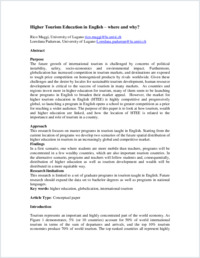Higher tourism education in English : where and why?
- Padurean, Loredana Istituto di ricerche economiche (IRE), Facoltà di scienze economiche, Università della Svizzera italiana, Svizzera
- Maggi, Rico Istituto di ricerche economiche (IRE), Facoltà di scienze economiche, Università della Svizzera italiana, Svizzera
-
2009
Published in:
- Tourism review. - Emerald Group. - 2009, vol. 64, no. 1, p. 48-58
English
Purpose – The future growth of international tourism is challenged by concerns of political instability, safety, socio-economics and environmental impact. Furthermore, globalization has increased competition in tourism markets, and destinations are exposed to tough price competition on homogenized products by rivals worldwide. Given these challenges and the desire by locales for sustainable tourism development, human resource development is critical to the success of tourism in many markets. As countries and regions invest more in higher education for tourism, many of them seem to be launching these programs in English to broaden their market appeal. However, the market for higher tourism education in English (HTEE) is highly competitive and progressively global, so launching a program in English opens a school to greater competition as a price for reaching a wider audience. The purpose of this paper is to look at how tourism, wealth and higher education are linked, and how the location of HTEE is related to the importance and role of tourism in a country. Design/methodology/approach – This research focuses on master programs in tourism taught in English. Starting from the current location of programs it develops two scenarios of the future spatial distribution of higher education in tourism in an increasingly global and competitive market. Findings – In a first scenario, one where students are more mobile than teachers, programs will be concentrated in a few wealthy countries, which are also important tourism countries. In the alternative scenario, programs and teachers will follow students and, consequentially, distribution of higher education as well as tourism development and wealth will be distributed in a more equitable way. Research limitations/implications – This research is limited to a set of graduate programs in tourism taught in English. Future research should expand the data set to bachelor degrees as well as programs in national languages. Originality/value – This paper provides useful information on how tourism, wealth and higher education are linked, and how the location of HTEE is related to the importance and role of tourism in a country.
- Language
-
- English
- Classification
- Economics
- License
-
License undefined
- Open access status
- green
- Identifiers
-
- RERO DOC 23224
- DOI 10.1108/16605370910948858
- ARK ark:/12658/srd1318355
- Persistent URL
- https://n2t.net/ark:/12658/srd1318355
Statistics
Document views: 159
File downloads:
- Texte intégral: 340
